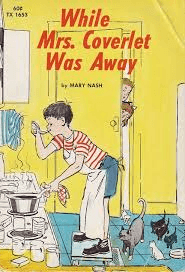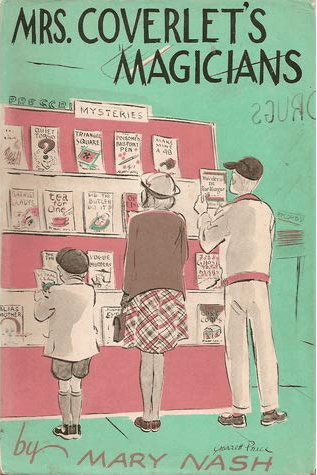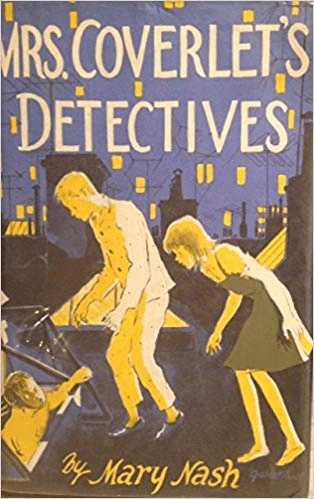 Everyone loves a good story about children who have gotten rid of the grown-ups. With their widowed father out of town, Malcolm, Molly, and Theobold (the Toad) are left alone when the housekeeper, Mrs. Coverlet, must go help her adult daughter who has broken her leg. They lead her to believe they will arrange for the spinster next door and the minister across the street to take care of them while she, Mrs. Coverlet, is away. They don’t.
Everyone loves a good story about children who have gotten rid of the grown-ups. With their widowed father out of town, Malcolm, Molly, and Theobold (the Toad) are left alone when the housekeeper, Mrs. Coverlet, must go help her adult daughter who has broken her leg. They lead her to believe they will arrange for the spinster next door and the minister across the street to take care of them while she, Mrs. Coverlet, is away. They don’t.
The children manage their affairs just fine all summer long, even embarking on projects to earn money. One project involves discovering that the Toad’s cat is extremely valuable, and selling it to a rich but sympathetic society lady. This sub-plot turns cleverly on the discovery that the cat, which is tortoiseshell, is a boy, not a girl, and is therefore quite rare. (It overplays how valuable these males are, and mistakenly says that calico males are not rare. This book created a generation of children who thought they were experts on tortoiseshell cats.)
In their biggest project, the children manufacture a rich, glossy, purplish gravy, which they name Heather’s Temptation and sell at the local grocery store, and to which the whole town becomes addicted due to its energizing properties. Though Heather’s Temptation contains a variety of weird ingredients like ketchup and grape jelly, the secret ingredient turns out to be the Vita-Bounce pills of their vitamin-salesman father.
 This idea may have come from Vitamin X, the key ingredient in Bita-Vita in Mr. Twigg’s Mistake, 1947 (a rather bad book by Robert Lawson, who is better known for Rabbit Hill and Ben and Me). We will pass quietly over any possible connection between Heather’s Temptation and the quasi-medicinal use of “pep pills,” usually containing amphetamine, in the 1930’s-60’s.
This idea may have come from Vitamin X, the key ingredient in Bita-Vita in Mr. Twigg’s Mistake, 1947 (a rather bad book by Robert Lawson, who is better known for Rabbit Hill and Ben and Me). We will pass quietly over any possible connection between Heather’s Temptation and the quasi-medicinal use of “pep pills,” usually containing amphetamine, in the 1930’s-60’s.
 The premise of the book is clearly owing to Chapter VIII of Then There Were Five, the third “Melendy” book by Elizabeth Enright. Mrs. Coverlet is the perfect twin of the Melendy family’s housekeeper-and-mother-substitute Cuffy. Both are summoned by a relative who has broken a bone in a fall, while the children’s father is out of town. Both are comically anguished at how their brood will survive without them, and both have to be bodily prevented from climbing back out of their ride to the train station. It is even perhaps not a coincidence (in the way that random associations can float through an author’s head) that the relative needing help in the Melendy book has the last name of Theobald.
The premise of the book is clearly owing to Chapter VIII of Then There Were Five, the third “Melendy” book by Elizabeth Enright. Mrs. Coverlet is the perfect twin of the Melendy family’s housekeeper-and-mother-substitute Cuffy. Both are summoned by a relative who has broken a bone in a fall, while the children’s father is out of town. Both are comically anguished at how their brood will survive without them, and both have to be bodily prevented from climbing back out of their ride to the train station. It is even perhaps not a coincidence (in the way that random associations can float through an author’s head) that the relative needing help in the Melendy book has the last name of Theobald.
 Both books in turn seem to owe something to Winterbound (1936, by Margery Williams Bianco, oddly enough the author of The Velveteen Rabbit), a depression-era novel for teens in which the father is away for work and the mother is called to attend to a sick relative.
Both books in turn seem to owe something to Winterbound (1936, by Margery Williams Bianco, oddly enough the author of The Velveteen Rabbit), a depression-era novel for teens in which the father is away for work and the mother is called to attend to a sick relative.
Mrs. Coverlet has one flat note, the smug self-importance of Toad (a descendent, perhaps, of Toad of Wind in the Willows), which is never effectively checked by his elders, and which is played for charm and laughs though it is neither charming nor funny.
The sequel, Mrs. Coverlet’s Magicians (1962), is also worth your time, though by the third book, Mrs. Coverlet’s Detectives (1965), the author seems to have used up her best ideas.


